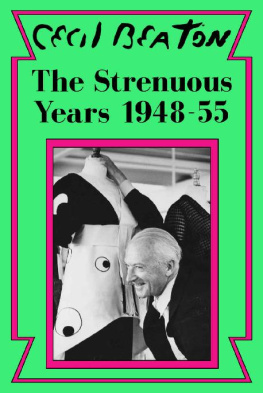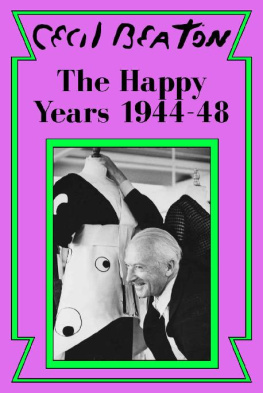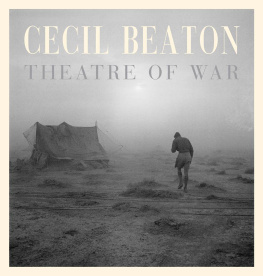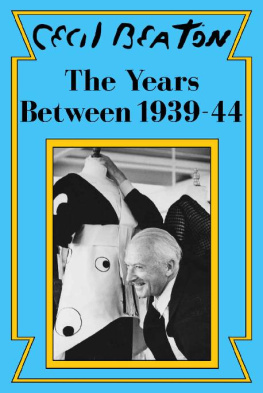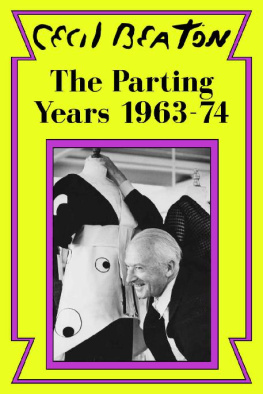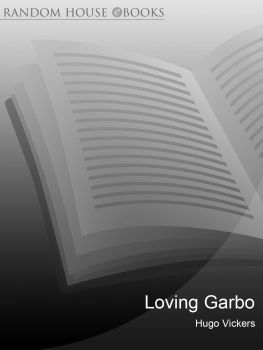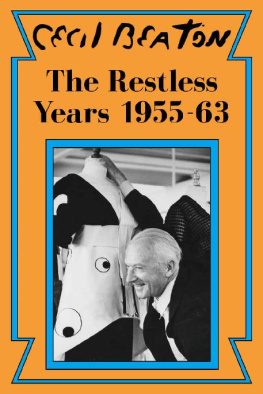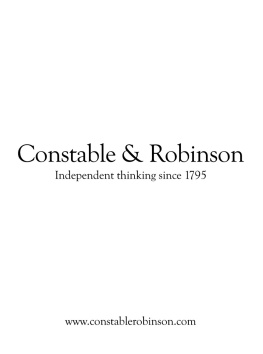Cecil Beaton - The Strenuous Years: 1948-55
Here you can read online Cecil Beaton - The Strenuous Years: 1948-55 full text of the book (entire story) in english for free. Download pdf and epub, get meaning, cover and reviews about this ebook. year: 2018, publisher: Sapere Books, genre: Non-fiction / History. Description of the work, (preface) as well as reviews are available. Best literature library LitArk.com created for fans of good reading and offers a wide selection of genres:
Romance novel
Science fiction
Adventure
Detective
Science
History
Home and family
Prose
Art
Politics
Computer
Non-fiction
Religion
Business
Children
Humor
Choose a favorite category and find really read worthwhile books. Enjoy immersion in the world of imagination, feel the emotions of the characters or learn something new for yourself, make an fascinating discovery.
- Book:The Strenuous Years: 1948-55
- Author:
- Publisher:Sapere Books
- Genre:
- Year:2018
- Rating:5 / 5
- Favourites:Add to favourites
- Your mark:
- 100
- 1
- 2
- 3
- 4
- 5
The Strenuous Years: 1948-55: summary, description and annotation
We offer to read an annotation, description, summary or preface (depends on what the author of the book "The Strenuous Years: 1948-55" wrote himself). If you haven't found the necessary information about the book — write in the comments, we will try to find it.
The Strenuous Years: 1948-55 — read online for free the complete book (whole text) full work
Below is the text of the book, divided by pages. System saving the place of the last page read, allows you to conveniently read the book "The Strenuous Years: 1948-55" online for free, without having to search again every time where you left off. Put a bookmark, and you can go to the page where you finished reading at any time.
Font size:
Interval:
Bookmark:
THE STRENUOUS YEARS
1948-55
Cecil Beatons Diaries
Volume Four

Table of Contents
Foreword to the New Edition
I welcome the republication of the six volumes of Cecil Beatons diaries, which so delighted readers between 1961 and 1978. I dont know if Cecil himself re-read every word of his manuscript diaries when selecting entries, but I suspect he probably did over a period of time. Some of the handwritten diaries were marked with the bits he wanted transcribed and when it came to the extracts about Greta Garbo, some of the pages were sellotaped closed. Even today, in the library of St Johns College, Cambridge, some of the original diaries are closed from public examination, though to be honest, most of the contents are now out in the open.
The only other person who has read all the manuscript diaries is me. It took me a long time to get through them, partly because his handwriting was so hard to read. I found that if I read one book a day, I had not done enough. If I did two in a day, then I ended up with a splitting headache! This in no way deflected from the enormous enjoyment in reading them.
Altogether there are 145 original manuscript diaries dating from Cecil going up to Cambridge in 1922 until he suffered a serious stroke in 1974. A few fragments of an earlier Harrow diary survive, and there is a final volume between 1978 and 1980, written in his left hand. 56 of these cover his time at Cambridge, some of which appear in The Wandering Years (1961) . 22 books cover the war years, and were used for The Years Between (1965), and nine books record his My Fair Lady experiences, some of which appear in The Restless Years (1976) and were the basis for Cecil Beatons Fair Lady (1964). These six volumes probably represent about ten per cent of what Cecil Beaton actually wrote.
The diaries attracted a great deal of attention when first published. James Pope-Hennessy wrote of Cecils thirst for self-revelation, adding that the unpublished volumes were surely the chronicle of our age. Referring to Cecils diaries, and those of Eddy Sackville-West, he also commented: We could not be hoisted to posterity on two spikier spikes.
I have to tell the reader that these volumes were not always quite the same as the originals. Some extracts were rewritten with hindsight, some entries kaleidoscoped and so forth. Certain extracts in these six volumes were slightly retouched in places, in order that Cecil could present his world to the reader exactly as he wished it presented. And none the worse for that.
Hugo Vickers
January 2018
Part I: London and Broadchalke, 1948-9
INDECISIONS ON RETURN TO ENGLAND
April, 1948
For most of us if we are fortunate each day seems to help us, even a little, along the road we have chosen to take. Often the going is pleasant, and so beguiled are we by the interest on the wayside that we hardly notice that we are travelling. Only at certain junctures are we faced with decisions and have to take stock of our situation. Have we come along the path we intended? And if so, do we go straight on? Or do we now decide to alter course?
On arrival back in England, after so long and momentous a stay in America, I felt that I had come to such a juncture. In what direction should I now go? For some considerable time after my return I felt in a bit of a quandary. What was my aim? What did I really want to do? Was it worthwhile continuing with all the doings that had occupied me for so long? Some decision must be made. But, as often happens, I made no decision. Force of habit resulted in my continuing along the same road.
At first progress was slow. There seemed to be less than the usual variety of distractions certainly less excitement. But, after a quiet beginning, I came to accept a certain loneliness, to make the best of it, and to rely more upon my old, familiar friends. They did not appear hurt or resentful that I had ignored them, or paid less attention to them than before: they were glad that I should pick up and mend the threads that had been temporarily broken. After being away for such a while, I found that they reappeared with a delightful freshness; I had forgotten that they were so bright, understanding and wise. They gave one a sense of stability merely by the fact that one felt one had their backing. I enjoyed even more than I remembered their wit and their art of conversation. They seemed more brilliant at argument, courageously holding unpopular views, filling the air with conflicting opinions without losing their tempers. In the worlds of art and entertainment so much was being created. There were many exciting things happening around me. London life seemed extraordinarily invigorating.
And then I rediscovered the joys of the English countryside. It was particularly wonderful now that I had a new house to cherish and a garden to develop. Already there were signs of the beginnings of spring: a line of snowdrops flanked the wall each side of the front door at Reddish, and soon other parts of the garden were beginning to respond to the reorganization already started. The apple trees were forming new growth, and the Victorian rosebeds disappeared almost without trace from the lawn. Inside the house, which I was growing to love, there was a lot to be done. The Charles II wallpapers were just as suitable as I had hoped for the library and my bedroom. Of furniture I had only the minimum, but excellent things could be found if one went often enough to Mr Percy Batess and other Salisbury antique shops.
For almost two years I have been free-wheeling along quite pleasantly without thinking much about making any money or giving thought to my career. Now I really must consider what most it is that I want to do. The war had given me an incentive to step out towards new photographic horizons, and to point my camera at more rugged aspects of life; but that incentive was now removed. Yet I did not want to go back to my old vomit. Enough of taking fashions on young models who survived just as long as their faces showed no sign of character, or of elderly, but rich harpies appearing as if butter would not melt in their terrible mouths. But I would not give up photography: it was an important part of my life. Perhaps I could be strong enough to turn down photographic offers that were no longer a challenge, and concentrate on people and subjects of real interest to me. I must also allow myself time to start painting seriously. Perhaps I would have more confidence if I took a course at some art college; I would see if this could be arranged. And there was always, at the back of my mind, the biting desire to write a play. Already I had three or four comedies relegated to the chest of drawers in my bedroom at Reddish; each represented much concentrated work, application and endeavour, besides months of expensive retyping. I knew they were not stage-worthy; they were merely repositories of hopes unfulfilled. However, I had long since an idea of writing a play about Gainsborough, an artist with whom I had a close rapport, and whom I felt was, in his dislike of pretentiousness and in other ways, not unlike my father. That would be of great help in developing the character. Perhaps this present lull provided the opportunity to start writing it.
But before the memories were any the less acute, I must write about my fifteen happy years at Ashcombe that house in the downs so little distance from my new home, but which I could never visit again. Soon all other activities became secondary. Even the diary entries were spasmodic: when writing on some specific subject, my journal jottings, which I enjoy, go by the board. With Ashcombe at the printers, normal existence began. Several tempting jobs were offered. Would I care to decorate a theatre? The Duke of Yorks was in a sorry state of disrepair, and despite post-war conditions Marianne Davis, the delightful, sporting young owner, considered it could be made to look pretty again. It could.
Font size:
Interval:
Bookmark:
Similar books «The Strenuous Years: 1948-55»
Look at similar books to The Strenuous Years: 1948-55. We have selected literature similar in name and meaning in the hope of providing readers with more options to find new, interesting, not yet read works.
Discussion, reviews of the book The Strenuous Years: 1948-55 and just readers' own opinions. Leave your comments, write what you think about the work, its meaning or the main characters. Specify what exactly you liked and what you didn't like, and why you think so.

